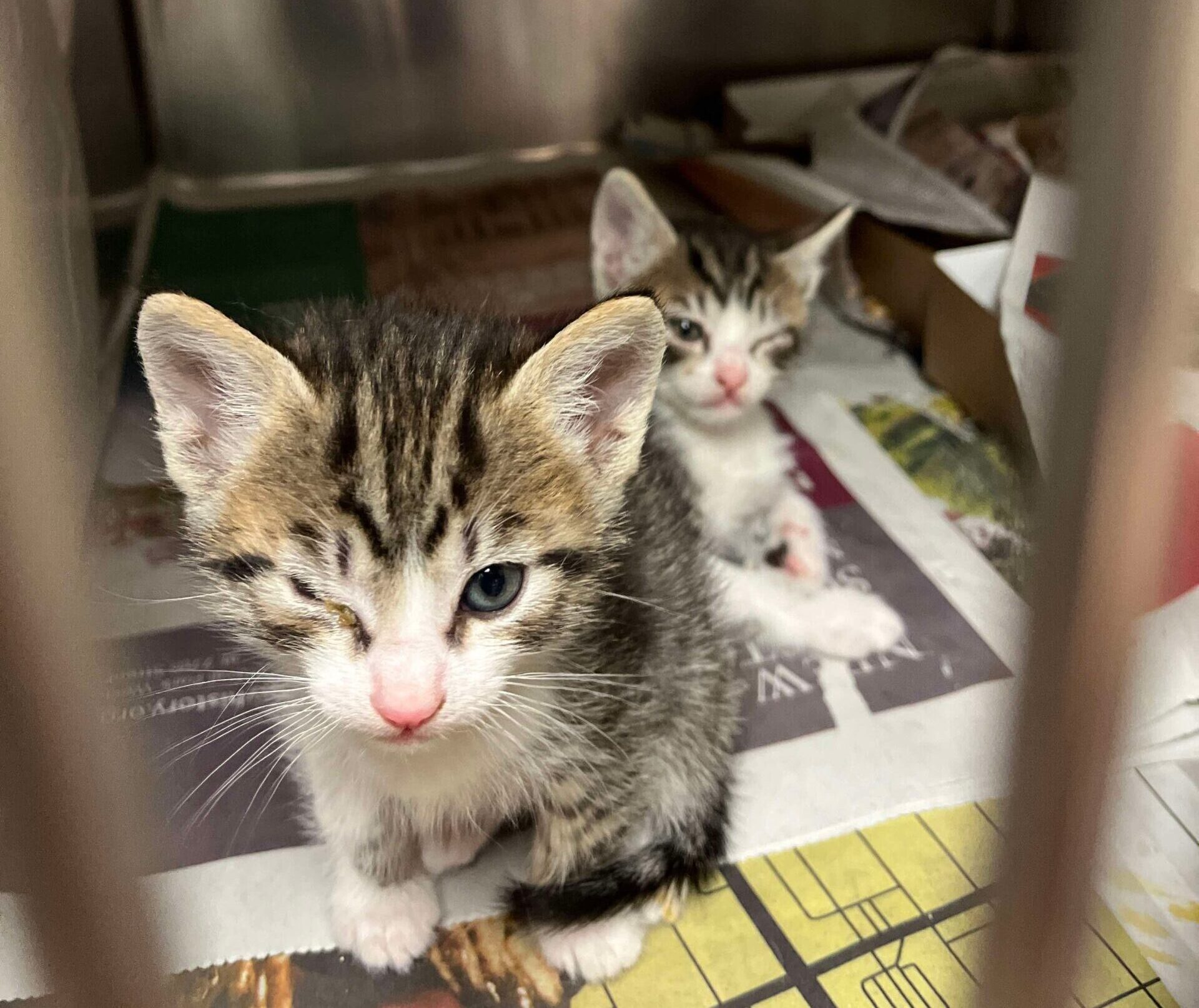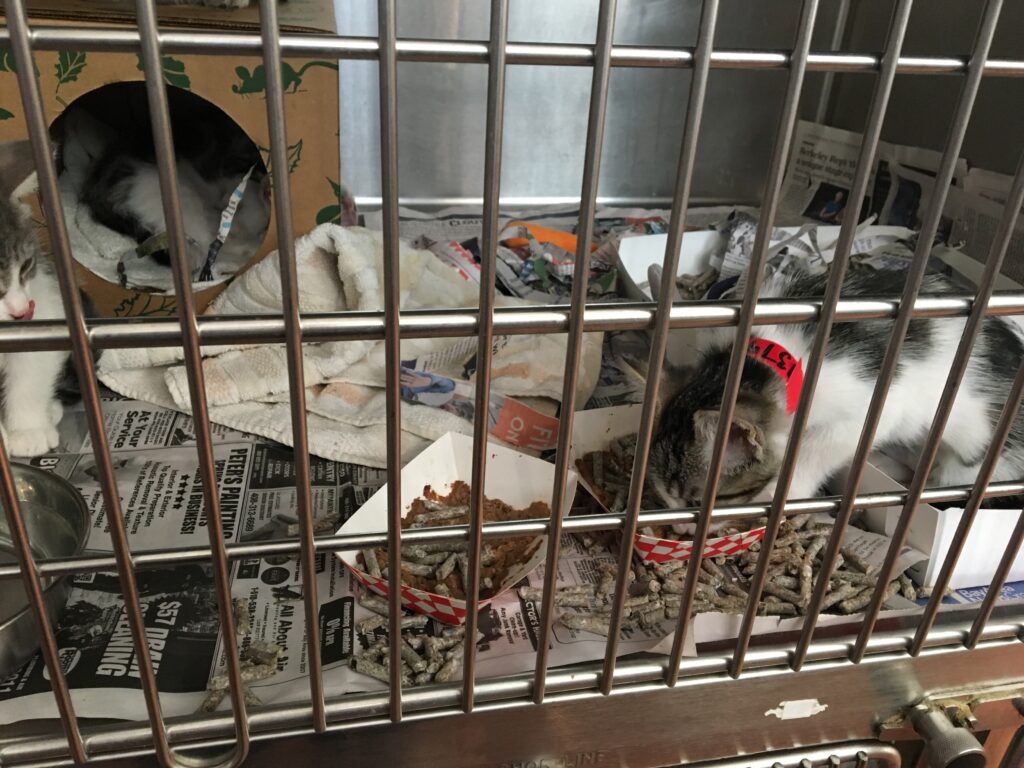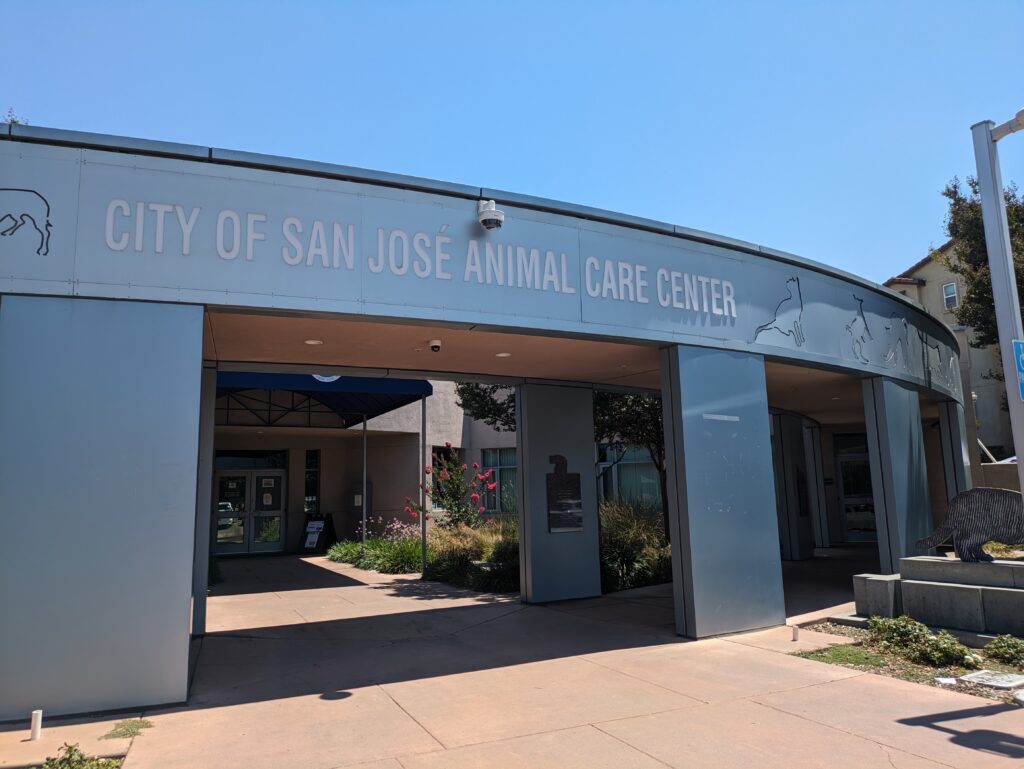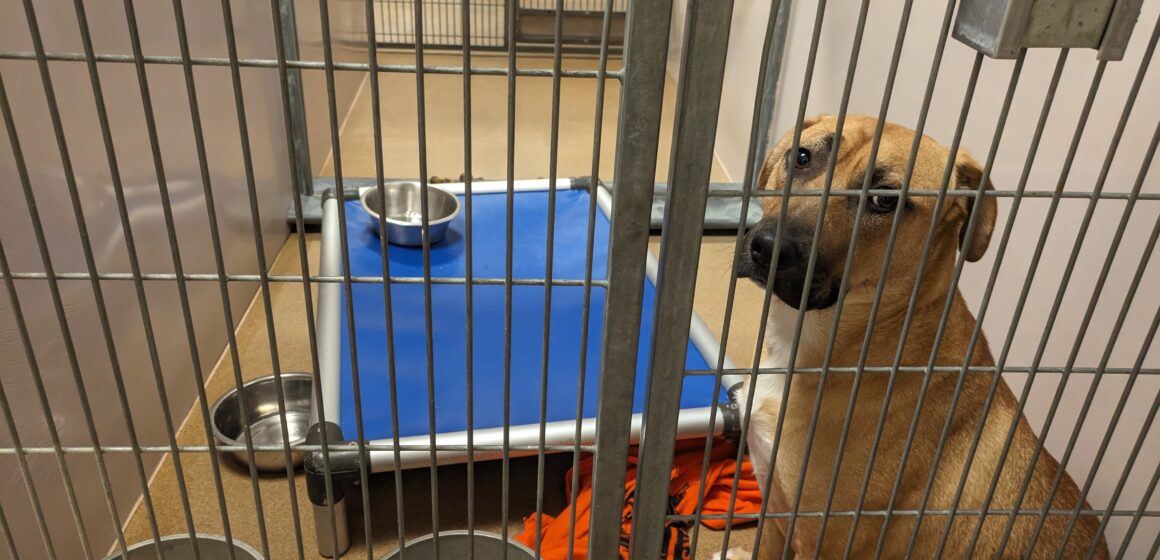After two years of trying, Lisa Picho finally got the call to work at the San Jose Animal Care Center. She was thrilled to start as an animal care attendant in March. But she said she quickly felt ill-equipped due to a lack of training.
She narrowly avoided a dog attack. She cleaned food and water dishes contaminated by ringworm without proper protection and witnessed experienced coworkers using harsh cleaning chemicals in kennels without proper dilution. Then one day she noticed two ringworm-infected kittens locked in a small area without food or water during a heat advisory. She told her managers, who she said brushed it off. She emailed them too, but didn’t hear back. When she returned for her next shift in June, management fired her for performance issues they’d never mentioned before, she said.
“They do not like to be questioned or made to look bad,” Picho told San José Spotlight. “When I brought up something that was very important to prevent deaths, they just fired me right away.”
Picho’s experience is not an outlier.
San José Spotlight spoke to multiple former employees and volunteers, some who wished to remain anonymous due to fear of repercussions, who relayed stories of poor leadership, mismanagement and retaliation. The stories, which span multiple years and are backed by numerous documents, show a pattern of management putting worker safety at risk and endangering hundreds of shelter animals.
An online petition that’s gained more than 3,200 signatures over the past month is driving community outrage over ongoing shelter problems. The petition calls for San Jose to create an emergency leadership contract to ensure effective oversight of existing management and better leadership hiring. The city opened the position for deputy director of animal care and services June 24.
@sanjosespotlight San José Spotlight spoke to multiple former San Jose Animal Care Center employees and volunteers, some who wished to remain anonymous due to fear of repercussions, who relayed stories of poor leadership, mismanagement and retaliation. The stories, which span multiple years and are backed by numerous documents, show a pattern of management, putting worker safety at risk and endangering hundreds of shelter animals. Read more at SanJoseSpotlight.com. #animals #animalshelter #sanjose #siliconvalley #bayarea #localnews
San Jose Public Works Director Matt Loesch will oversee the shelter until the position is filled, while Kiska Icard and Dr. Elizabeth Kather will remain in their respective roles as division manager and medical director.
Loesch said the shelter is improving and has implemented recommendations listed in a 2024 audit, which found the facility consistently housed about 200 animals above its maximum capacity of 510. Completed recommendations, according to a May neighborhood presentation and city staff, include an updated outreach strategy during kitten season, finalized euthanasia policies, a review of the shelter facility’s condition and increased outreach to veterinarians for vaccination certificates.
The city also increased animal care services’ annual budget from $15.4 million in fiscal year 2024-25 to $17.2 million in fiscal year 2025-26.
“(Some) of the petition’s demands align directly with the audit’s findings,” Loesch told San José Spotlight. “Since the petition began, we launched a nationwide recruitment for a new deputy director to oversee the animal care and services division — we look forward to renewed community partnerships that will come with that new leader.”
Kit O’Doherty, director of Partners in Animal Care & Compassion and animal shelter volunteer for 22 years, said the shelter’s issues stem from upper management. She said as the lead of a rescue who interacts with the San Jose shelter, she’s seen careless management when it comes to issues including dogs covered in feces, untrained staff handling potentially dangerous animals and unnecessary euthanasias even after the audit.
O’Doherty said she’s frustrated at how long it’s taken the city to address the problems because the situation calls for a complete overhaul.
“It came down to just having complete incompetence at the leadership level at the shelter,” she told San José Spotlight. “The city is well aware of this, and yet it’s taken three years of turning over every stone we as activists and advocates can possibly think of to get to a place where we are finally have an (opening) for the director position.”
Mismanagement and lack of training
Residents began questioning the shelter’s leadership a few years ago when management changed to former Deputy Director Jay Terrado, who left last year and was granted disability retirement last month. Icard became division manager after serving as a management analyst for the Monterey County Behavioral Health Department according to her LinkedIn profile, and Kather became medical director in 2022, according to Transparent California.
Former staff and volunteers told San José Spotlight management ignored moldy and corroded pet food, often failed to file incident reports for employee injuries and verbally abused staff. Past employees also said there was little training for daily tasks and emergencies, adding they often paid for pet supplies out of their own pockets.

Terrado and Kather did not respond to requests for comment. Icard was unavailable for comment. City officials said management roles are filled through rigorous recruitment processes with multiple interviews, but declined to comment on specific hiring processes, citing employee privacy rights.
The community wrath reached a fevered pitch after Lola, a sick dog at the shelter, died this May.
Courtney Ferro was the animal care attendant who found Lola. She was working the night shift around 9 p.m., caring for neonatal kittens, when she left the room and heard a weird beeping noise. She poked her head into the room where the noise was coming from and noticed Lola slumped over in her kennel. When Ferro investigated, she found Lola had tangled herself in a slip leash and IV cord and was strangling herself.
Ferro quickly unwrapped Lola with the help of another employee and reached out to management because she wasn’t trained to handle medical emergencies — there was no medical staff on site. Ferro said it took over an hour to get authorization to take Lola to the vet because management didn’t respond. By the time she got the OK, it was too late. Lola had died.
Traumatized, Ferro quit soon after the incident. She said Lola should never have been left unsupervised with an IV cord and leash in her kennel. She said one of her coworkers told a manager about the beeping noise a few hours earlier and was instructed to turn the machine off without further investigation.

Ferro filed a whistleblower report with the city, and recently received a letter from the city manager’s office stating the incident had been resolved without explanation, according to documents obtained by San José Spotlight.
“Animals are being treated badly and low-level staff are being treated badly,” Ferro told San José Spotlight. “It’s great that we have low-level staff and volunteers who care for the animals and try to make things better, but it’s management who needs to actually make the changes that are needed, and they just don’t care.”
Loesch did not comment on Lola’s death.
The incident caught the attention of Mayor Matt Mahan, who called for the 2024 audit. Mahan said the new deputy director could mitigate the issues that have plagued the shelter for years.
“My hope is they’ll bring new energy and strong oversight to a shelter already filled with dedicated staff and volunteers who work every day to care for our furry friends,” he said in a letter to the community. “This won’t be the last change we make at (the shelter), but it’s an important one. And it wouldn’t be happening without friends of the shelter speaking up and demanding better.”
History of retaliation
The problems extend beyond mismanagement.
Multiple employees told San José Spotlight about a toxic work culture that encourages retaliation against staff who raise concerns, including a former animal care attendant.
The employee, who worked there for roughly four years, said they were reprimanded for taking sick shelter kittens to the vet without approval. But that was minor compared to a 2023 incident involving a feral cat.
They told San José Spotlight an untrained employee forgot to shut the kennel door on the cat, who got out. They sustained more than 20 puncture wounds in both hands getting the cat back in the kennel, leaving them with minimal hand mobility and permanent muscle damage and tendonitis.
The former employee said management revealed they were under investigation for the incident to see if they had purposefully injured themselves. They went to the union with a complaint following the incident and consistent verbal abuse, and a month later, in December 2023, were fired with no solid explanation.
“Management did not take care of their employees,” the former employee told San José Spotlight. “Anytime we did bring up a concern or address a concern, we would get in trouble for it, or they would be like, ‘Shut up. Just do your job, we don’t need to hear it.'”
Medical care
Things haven’t been much better in the medical department.
Rachel, a former registered veterinary technician who asked to only use her first name over concerns of retaliation, worked at the shelter for about five months in 2023. She said medical treatment was inhumane, with cats often dying of preventable flea anemia or a contagious disease because infected cats weren’t euthanized. She added sick cats were often spayed or neutered despite the danger to their health.
“What would end up happening was the cats would just die in their kennels. It was really awful,” she told San José Spotlight. “People would find cats dead in the kennel all the time. Like, it was daily.”
Rachel said she brought it to the city’s attention, who she felt took it seriously.
Then she received an email from management stating she was off the schedule until further notice. She asked the city to look into why, and management said it was because she took an extremely sick cat to a rescue. Rachel, who left shortly after, said that wasn’t true and wants management replaced.
Loesch did not respond to questions about retaliation.

Community trust
The shelter’s history has eroded trust with residents, especially among the rescue community.
The 2024 audit found 40% of rescues reported a positive experience working with the San Jose shelter, and about 44% said they received sufficient information to take an animal into their rescue. And while adoptions for dogs and cats went up from 1,468 in 2020-21 to 4,517 in 2023-24, pets taken into rescues went down from 4,776 to 1,286.
O’Doherty signed onto an open letter 36 rescue groups submitted to the city in January. The letter cited the death of a healthy dog named Rufus last December. He was left unsupervised in his kennel anesthetized, following a routine neutering. Rufus’ necropsy listed his cause of death as undetermined, according to the letter.
O’Doherty said the lack of training and protocol led to Rufus’ death, which emotionally affected staff and volunteers.
“Everybody’s shooting from the hip,” O’Doherty said. “It’s the wild west in that shelter, and it’s not just the animals that pay the price. It’s the human beings.”
 Loesch said the shelter has addressed some community concerns, including kitten intake processes and public education. He said the petition and activist work reflect how much the community cares, a commitment shelter staff share.
Loesch said the shelter has addressed some community concerns, including kitten intake processes and public education. He said the petition and activist work reflect how much the community cares, a commitment shelter staff share.
“We invite every petitioner to become part of the solution: foster, volunteer or adopt,” he told San José Spotlight. “We extend our thanks to the 300 volunteers, rescue transfer partners and adopters who have helped us deliver better outcomes for 7,000 animals last year.”
Ferro said new management is the key to fixing the shelter — it’s a top down problem.
“It would definitely be a step in the right direction,” she said. “They have caused some damage that is going to take a lot of time to come back from.”
Story updated July 17 at 2:53 p.m. Original story published July 13 at 8:30 a.m.
Contact Annalise Freimarck at [email protected] or follow @annalise_ellen on X.



Leave a Reply
You must be logged in to post a comment.